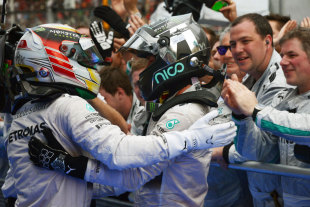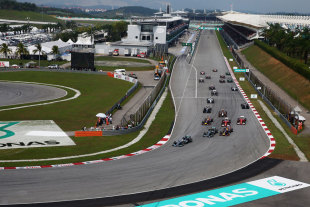ESPN analyses the main talking points from the Malaysian Grand Prix weekend

© Getty Images
Enlarge
Hamilton 'too quick' for Rosberg
"I was just trying to chase Lewis but he was a bit too quick today" - The honest assessment of Nico Rosberg after finishing 17 seconds behind his team-mate at the Malaysian Grand Prix. Sunday's race was proof, if it was needed, that the Hamilton/Rosberg battle is going to have plenty of twists and turns as the season progresses. Many people expect Rosberg to get the better of Hamilton this year under the new formula of fuel saving and race management, but in Sepang fuel usage was not an issue and Hamilton's natural talent burned bright. Next weekend's race in Bahrain is expected to be one of the hardest on fuel usage and should provide championship-leader Rosberg with a chance to play to his strengths. At the moment the team looks harmonious, but as the season progresses expect the hugs in parc ferme become a little more forced.
Lost in translation
There's something about Malaysia that messes with team orders. Maybe it's the heat, maybe it's the humidity, but for the second year in a row commands from the pit wall failed to have their intended impact on the track. This time it was Felipe Massa who defied his team and kept Valtteri Bottas at bay towards the end of the race. Williams wanted Bottas to have a crack at passing Jenson Button as the Finn had fresher tyres and Massa's engine temperatures were running rather high. The plan was to let Bottas attack Button but reverse the positions again if he could not get past the McLaren. However, Massa, who said he fully understood the message but did not agree with it, was not willing to play game as he felt passing Button was not possible. The fact that the team's radio message mimicked Ferrari's team orders at the 2010 German Grand Prix - when Massa had to give up his last proper shot at a race victory to Fernando Alonso - will not have gone down well. After talking to the media, those involved were set to discuss the incident before leaving the track, and the feeling seemed to be that Massa's disobedience did not go down well.
Getting technical
The Malaysian Grand Prix weekend shed new light on the Red Bull fuel-flow controversy in Australia. It's clear that Red Bull believes it has a strong case, which is largely based on its belief that it was entirely within its rights to use its own back-up method of measuring the fuel-flow rate because the FIA homologated sensor was giving misleading readings that meant the car was down on power. A technical directive from the FIA says only it can decide when the back-up system (in this case measurements from the RB10's fuel rail) is used, but Red Bull has pointed out that technical directives have no regulatory value. Fighting from its own corner, the FIA is adamant that the regulations require teams to use its sensors, which it claims are accurate to within 0.5%. In Malaysia Red Bull experienced a failure of the fuel sensor on Daniel Ricciardo's car and used the back-up system, but because the sensor completely failed, rather than just providing inaccurate readings, the same debate did not occur.

© Getty Images
Enlarge
Volume control
The great F1 sound debate continues to rumble on, with Sebastian Vettel stoking the fire ahead of this weekend's action saying the new engines sound "shit". The comments sounded a little petulant from a reigning champion whose team is struggling with the new power unit, but in an era when drivers so rarely speak their mind it was refreshing to have one being so blunt. However, the point that seems to be missed is that the new V6 turbos are not going away. The new technology might not turn on the casual viewer, but it is exciting for car manufacturers and sponsors, which are essential for keeping the show on the road. Honda's arrival next year is entirely down to the new formula and is positive for the longevity of the sport after the haemorrhaging of big-name manufacturers in 2009 and 2010. The extra torque of the new power units have also made the cars more twitchy, as well as providing another performance differentiator. On Sunday Nico Hulkenberg and Fernando Alonso had a great battle for fourth position as the Force India out-punched the Ferrari for power but was on older tyres and lacking grip in the corners.
Points mean penalties
Three drivers added points to their superlicences at the weekend, with Valtteri Bottas, Jules Bianchi and Kevin Magnussen all incurring the wrath of the stewards. Under new regulations this year and in a bid to punish repeat offenders, drivers will be banned for one race if they collect 12 penalty points in the space of 12 months. Bottas earned his two points for blocking, while Bianchi and Magnussen both caused first lap incidents. The points may seem a little harsh - Bottas felt he had done nothing wrong in very tricky conditions and Bianchi was carrying damage from an incident at Turn 1 when he hit Pastor Maldonado - but it's a good way to keep drivers on their toes. None of the three are likely to change their approaches in the coming races and they all have reputations for staying out of trouble, but with a couple of spots of bad luck in the next 12 months they could find themselves in a tricky situation at the start of next season.Laurence Edmondson is deputy editor of ESPNF1
© ESPN Sports Media Ltd.
Laurence Edmondson

 Laurence Edmondson is deputy editor of ESPNF1 Laurence Edmondson grew up on a Sunday afternoon diet of Ayrton Senna and Nigel Mansell and first stepped in the paddock as a Bridgestone competition finalist in 2005. He worked for ITV-F1 after graduating from university and has been ESPNF1's deputy editor since 2010
Laurence Edmondson is deputy editor of ESPNF1 Laurence Edmondson grew up on a Sunday afternoon diet of Ayrton Senna and Nigel Mansell and first stepped in the paddock as a Bridgestone competition finalist in 2005. He worked for ITV-F1 after graduating from university and has been ESPNF1's deputy editor since 2010

